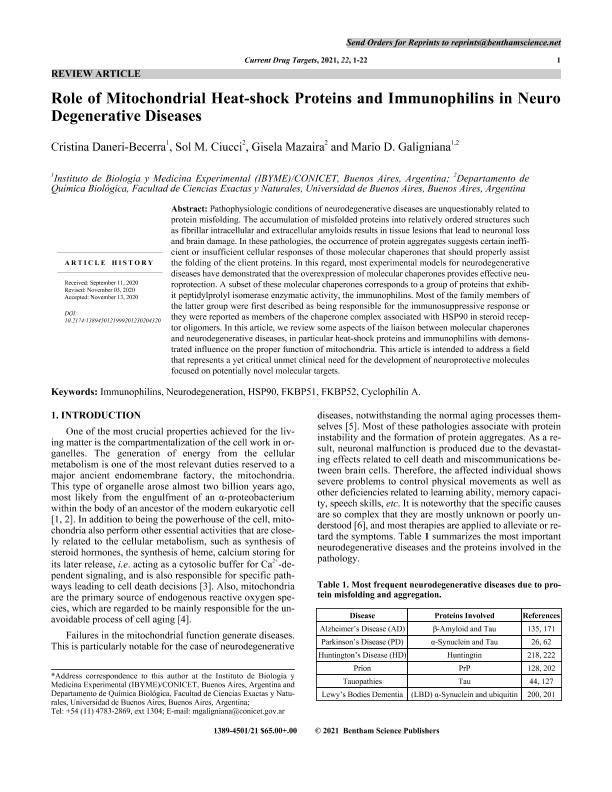Artículo
Role of mitochondrial heat-shock proteins and immunophilins in neurodegenerative diseases
Daneri Becerra, Cristina del Rosario ; Ciucci, Sol Micaela
; Ciucci, Sol Micaela ; Mazaira, Gisela Ileana
; Mazaira, Gisela Ileana ; Galigniana, Mario Daniel
; Galigniana, Mario Daniel
 ; Ciucci, Sol Micaela
; Ciucci, Sol Micaela ; Mazaira, Gisela Ileana
; Mazaira, Gisela Ileana ; Galigniana, Mario Daniel
; Galigniana, Mario Daniel
Fecha de publicación:
2021
Editorial:
Bentham Science Publishers
Revista:
Current Drug Targets
ISSN:
1389-4501
Idioma:
Inglés
Tipo de recurso:
Artículo publicado
Clasificación temática:
Resumen
Pathophysiologic conditions of neurodegenerative diseases are unquestionably related to protein misfolding. The accumulation of misfolded proteins into relatively ordered structures such as fibrillar intracellular and extracellular amyloids results in tissue lesions that lead to neuronal loss and brain damage. In these pathologies, the occurrence of protein aggregates suggests certain inefficient or insufficient cellular response of those molecular chaperones that should properly assist the folding of the client proteins. In this regard, all the experimental models for neurodegenerative diseases have demonstrated that the overexpression of molecular chaperones provide effective neuroprotection. A subset of these molecular chaperones corresponds to a group of proteins that exhibit peptidylprolyl isomerase enzymatic activity, the immunophilins. Most of the family members of the latter group were first described as responsible of the immunosuppressive response or they were reported as members of the chaperone complex associated with HSP90 in steroid receptor oligomers. In this article we review some aspects of the liaison between molecular chaperones and neurodegenerative diseases, in particular heat-shock proteins and immunophilins with demonstrated influence in the proper function of mitochondria. This article is intended to address a field that represents a yet critical unmet clinical need for the development of neuroprotective molecules focused on potentially novel molecular targets.
Palabras clave:
CYCLOPHILIN-A
,
IMMUNOPHILINS
,
NEURODEGENERATION
,
HSP90
,
FKBP51
,
FKBP52
Archivos asociados
Licencia
Identificadores
Colecciones
Articulos(IBYME)
Articulos de INST.DE BIOLOGIA Y MEDICINA EXPERIMENTAL (I)
Articulos de INST.DE BIOLOGIA Y MEDICINA EXPERIMENTAL (I)
Citación
Daneri Becerra, Cristina del Rosario; Ciucci, Sol Micaela; Mazaira, Gisela Ileana; Galigniana, Mario Daniel; Role of mitochondrial heat-shock proteins and immunophilins in neurodegenerative diseases; Bentham Science Publishers; Current Drug Targets; 22; 2021; 1-21
Compartir
Altmétricas



